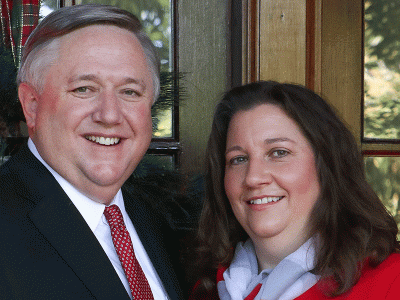A True Story of Caregiving for a Husband with Chronic Pain
Debbie Smith received the phone call that no one wants to get.
Her husband, Mark, had been in an auto crash. The other driver, going 60 miles per hour, had abruptly veered into Mark’s lane, ramming the driver-side front end of his Taurus.
When she arrived at the scene, a crack zigzagged across Debbie’s heart. “I didn’t see how anyone could survive such a bad crash,” she thought. As they carried Mark’s stretcher to the ambulance, Debbie ran to his side and cried, “Honey, I’m here!”
The accident occurred in 1996. Those three comforting words have been Debbie’s refrain ever since.
Bleak Prognosis
The impact tore off three inches of bone at his left elbow and fractured the forearm in multiple places. The surgery to stem Mark’s bleeding and to save his arm took eight hours. The surgeon implanted metal plates, screws and bone-growth stimulators under the skin, but Mark’s left arm would never again be as useful as his right arm.
Six days later, a surgeon toiled over Mark’s pulverized hip, installing thirteen screws to reconnect pieces of bone. His words were grim. “There’s a possibility Mark will never walk again, or if he does, it will be with great difficulty.”
Mark faced horrific pain, sleeplessness, excruciating rehab and uncertainty about future mobility. His new position as an academic administrator at Indiana Wesleyan University, as well as his calling from God to serve eventually as a Christian college president, appeared in jeopardy.
Yet It wasn’t just Mark who needed God’s intervention. Like never before, Debbie also needed the Lord’s help.
Debbie’s Dilemma
Mark needed his wife’s presence and emotional support during his three-week hospitalization. Yet caring for their 11-month-old son meant she couldn’t be with Mark around the clock.
Her burden for Mark escalated when he called her at 2:00 a.m., weeping. He needed to share his discouragement with her, to hear his beloved’s voice. Hearing Mark cry aloud in pain posed another challenge. “Once they came to get him for an X-ray,” Debbie recalls. “His pain spiked so much when they moved him that he screamed. When someone you love hurts that much, it makes you hurt, too.”
When doctors released him to go home, Mark was still bedridden. Since no hospital staff were around to assist, he needed a more intensive caregiving role from Debbie. When this realization dawned, Debbie cried, “Oh God, I’m on my own. I need Your help!”
“Mark required lots of TLC!” Debbie states. Once, she came whisker-close to dialing 911. “Mark, tired of getting wipe-off baths, was determined to bathe in the tub. Getting him in the tub was hard enough, but getting him out of the bathtub was almost impossible. I could just imagine what the 911 operator would say when I told her my husband was stuck in the tub! But we kept trying, me straining to lift him up and Mark helping by using his right arm and leg to brace himself. It took a while and Mark winced in pain, but we did it!”
In addition to his physical care, Debbie took over duties that had been Mark’s domain, such as paying bills. A friend said, “Debbie, I don’t see how you do it all!”
Yet she didn’t do it alone. What means of sustaining grace did God provide?
God’s Word
Clinging to God’s Word shifted Debbie’s focus away from their adversity onto the Lord. “Psalm 121 became a favorite passage,” she recalls. “I consulted it many times during those first few weeks.”
Debbie often camped out in verses 1-2: “I will lift my eyes to the mountains; from whence shall my help come? My help comes from the Lord, who made heaven and earth.” Psalm 91:15 also buttressed her faith. Referring to a person who trusts Him, God said, “He will call upon me, and I will answer him; I will be with him in trouble; I will rescue him and honor him.”
The Bible’s teaching on God’s sovereignty proved invaluable in Debbie’s handling of a setback caused by another person’s carelessness. She says, “My theme became ‘God allowed this to happen and now we’ll have to trust Him to take care of us.’ I said this to Mark many times while he recuperated. We didn’t know why the wreck happened, but we were comforted by Who governed what had happened.”
God’s sovereignty instilled a needed perspective when she wanted to ask, “Why did this happen?” or to stew over thoughts such as, “All this is so unfair!” God gave her the capacity to put one foot in front of the other and to keep asking herself, “Now what needs to be done next?”
Exhausted and emotionally numb, in the months following the crash sometimes Debbie couldn’t concentrate enough to read God’s Word. Even then the Holy Spirit found a way to soothe her soul with God’s truth. “I often listened to Christian music as I did chores,” she explains. “Many of the songs consisted of Bible passages put to music. After Mark came home from the hospital, we’d watch Bill Gaither’s Homecoming videos. The lyrics of time-tested hymns mirrored precious truths that offered hope.”
Heartfelt Prayer
“Things were so stressful that I poured my heart out to the Lord time and again,” Debbie reminisces. “I remember thinking that He was probably growing weary of me. Then I’d tell myself that God never gets tired of my pleading, because His Word so often invites us to come to Him with our needs.” Verses such as Psalm 50:15 prompted her to cry out to God. God said to His people, “Call on Me in the day of trouble. I shall rescue you, and you will honor Me.”
Debbie’s prayers included confession as well as petition. “At times I felt bitterness creeping in since all we were going through wasn’t Mark’s fault. Anger and frustration would well up inside me, especially when I saw how much Mark was hurting. Then God’s Spirit would convict me and I’d cry out for forgiveness, seeking His power to release my resentment.” Those desperate pleas cracked the crust of bitterness forming over her heart, enabling her to feel what she cognitively believed, that God is wise and good.
The Body of Christ
From the time Mark’s first surgery began on the afternoon of the crash until surgeons finished at 2:00 a.m., the presence of at least one other person buttressed Debbie’s spirit. Without being asked, Christian friends provided childcare and took on household chores so Debbie could spend days with Mark.
The phone also became a conduit through which others’ love flowed. “When I’d get home each evening from the hospital,” Debbie reflects, “a highlight of my day was listening to voice messages. Every day, scores of folks assured me of their prayers and concern. I realized I wasn’t alone in bearing the burden of Mark’s accident and recovery.”
In the months following the accident, the Smiths received over 400 encouraging cards or notes. Though no one solicited funds, many cards included money. Over $10,000 came in to help pay medical bills.
“I’m the type of person who wants to handle things myself,” Debbie acknowledges. “But after the accident, I didn’t have a choice but to rely on others. So many people were interceding for us that I literally, physically, felt the effect of those prayers.”
Ongoing Care
Mark’s recovery far exceeded physicians’ initial expectations. He later served as president of Ohio Christian University (2006-2017), and since July 2017 he has been in the same role at Columbia International University. Both universities have experienced dramatic increases in enrollment, program expansion and facility enhancement due to his effective leadership. Yet bodily pain still wracks his body on a daily basis, typically worsening late in the day. When his pain escalates, Debbie holds his hand and prays with him. She rubs pain-relieving cream on him each evening and massages his legs and shoulders. She brings him an ice pack or heating pad as needed.
On his worst days, she looks for fresh ways to distract him from the pain, such as taking him on car rides through different neighborhoods. She doesn’t plan social engagements without consulting him, since she never knows how much he will be hurting when he arrives home from work.
Mark’s continued difficulty sleeping often leaves Debbie sleep-deprived, too. Yet she thanks the Lord that He spared Mark and has blessed him with such a fruitful ministry. Debbie keeps asking the Lord for a servant heart that doesn’t tolerate complaining.
No matter what pressures or demands he faces as a high-profile leader, Mark knows he can still count on those supportive words he first heard while prostrate on a stretcher in 1996: “Honey, I’m Here!”
(The photo that accompanies this post is a recent one of Mark and Debbie Smith, used by CIU in a letter to friends of the university.)
__________________
Which means of grace that Debbie cited has meant most to you during your own affliction or your caregiving? When you’ve had to care for a spouse or another loved one during an illness, recovery from surgery, or due to his or her chronic pain, in what additional ways has the Lord sustained you? What tips for caregiving have you learned the hard way? I’d love to hear from you!
I culled material from this article from several different chapters of a new book about Dr. Mark Smith’s chronic pain, and God’s sustaining grace toward him and Debbie. It is titled, Oh God, I’m Dying! How God Redeems Pain for Our Good and for His Glory (Morgan James). The official release date for the book was November 24. Use this link for more information about the book, and for a purchase link. If you think Debbie’s story can encourage caregivers you know, please pass this article along to them.





0 Comments